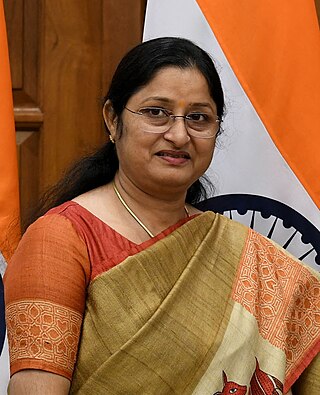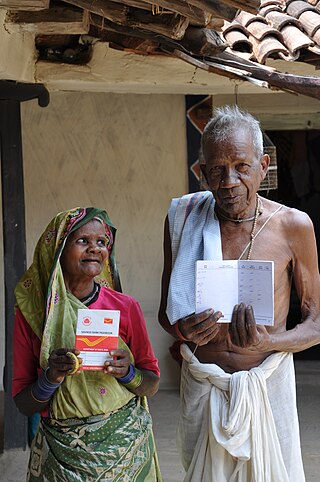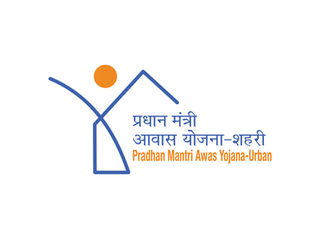Related Research Articles

Bhupesh Baghel, popularly known as Kaka, is an Indian politician who served as the 3rd Chief Minister of Chhattisgarh from 2018 to 2023. He was president of Chhattisgarh Pradesh Congress from 2014 to 2019. He represented the Patan constituency in the Chhattisgarh Legislative Assembly since 2013 and from 2003 to 2008. He had been cabinet minister of Transportation in undivided Madhya Pradesh in Digvijaya Singh government from 1999 to 2003. He was first Minister for Revenue, Public Health Engineering and Relief Work of Chhattisgarh.
India has a robust social security legislative framework governing social security, encompassing multiple labour laws and regulations. These laws govern various aspects of social security, particularly focusing on the welfare of the workforce. The primary objective of these measures is to foster sound industrial relations, cultivate a high-quality work environment, ensure legislative compliance, and mitigate risks such as accidents and health concerns. Moreover, social security initiatives aim to safeguard against social risks such as retirement, maternity, healthcare and unemployment while tax-funded social assistance aims to reduce inequalities and poverty. The Directive Principles of State Policy, enshrined in Part IV of the Indian Constitution reflects that India is a welfare state. Food security to all Indians are guaranteed under the National Food Security Act, 2013 where the government provides highly subsidised food grains or a food security allowance to economically vulnerable people. The system has since been universalised with the passing of The Code on Social Security, 2020. These cover most of the Indian population with social protection in various situations in their lives.

The Ministry of Women and Child Development, a branch of the Government of India, is an apex body for formulation and administration of the rules and regulations and laws relating to women and child development in India. The current minister for the Ministry of Women and Child Development is Annpurna Devi having held the portfolio since 2024.
The 2009 Union budget of India was presented by the finance minister, Pranab Mukherjee, on 6 July 2009.
Vidyaben Shah was an Indian social worker and activist known for her work with children, women and the elderly in India. While she was already serving as Vice-President, she was appointed the first non-officio President of the New Delhi Municipal Council (NDMC) by Prime Minister Indira Gandhi in 1975. She has held several leading positions in the field of social welfare since the 1940s. Vidyaben Shah died at the age of 97 on 19 June 2020 at her residence in Delhi, her son Mihir Shah confirmed the news of Vidyaben Shah death.

Pradhan Mantri Gramin Aawas Yojana is a social welfare programme under the Ministry of Rural Development, Government of India, to provide housing for the rural poor in India. A similar scheme for urban poor was launched in 2015 as Housing for All by 2022. Indira Awas Yojana was launched in 1985 by Rajiv Gandhi, the Prime Minister of India, as one of the major flagship programs of the Ministry of Rural Development to construct houses for the Below Poverty Line population in the villages.

The National Health Mission (NHM) was launched by the government of India in 2013 subsuming the National Rural Health Mission and National Urban Health Mission. It was further extended in March 2018, to continue until March 2020. It is headed by Mission Director and monitored by National Level Monitors appointed by the Government of India.Rural Health Mission (NRHM) and the recently launched National Urban Health Mission (NUHM). Main program components include Health System Strengthening (RMNCH+A) in rural and urban areas- Reproductive-Maternal- Neonatal-Child and Adolescent Health, and Communicable and Non-Communicable Diseases. NHM envisages achievement of universal access to equitable, affordable and quality health care services that are accountable and responsive to the needs of the people.

The National Social Assistance Programme (NSAP) is a Centrally Sponsored Scheme of the Government of India that provides financial assistance to the elderly, widows and persons with disabilities in the form of social pensions. The NSAP scheme only includes Below Poverty Line individuals as beneficiaries.

The Rajiv Gandhi Mahila Vikas Pari Yojana (RGMVP) is the flagship program of Rajiv Gandhi Charitable Trust, a registered non-profit institution, working for poverty reduction, women empowerment, and rural development in Uttar Pradesh, India, since 2002. RGMVP believes that "the poor have a strong desire and innate ability to overcome poverty." It aims to organize poor rural women into community institutions and promotes financial inclusion, health care, livelihood enhancement, education, and the environment.
The Rajiv Gandhi Scheme for Empowerment of Adolescent Girls (RGSEAG) Sabla is a centrally sponsored program of the Government of India initiated on 1 April 2011 under the Ministry of Women and Child Development.

Pradhan Mantri Matru Vandana Yojana (PMMVY), previously known as the Indira Gandhi Matritva Sahyog Yojana, is a maternity benefit program run by the government of India. It was originally launched in 2010 and renamed in 2017. The scheme is implemented by the Ministry of Women and Child Development. It is a conditional cash transfer scheme for pregnant and lactating women of 19 years of age or above for the first live birth.
Gutta Muniratnam was an Indian social worker, a member of the National Planning Commission of India and the founder of Rashtriya Seva Samithi (RASS), a non governmental organization engaged in the social welfare activities in over 2500 socio-economically backward villages in the Rayalaseema region, spread across the present day states of Andhra Pradesh and Telangana. He was honored by the Government of India, in 2012, with the fourth highest Indian civilian award of Padma Shri.

Pradhan Mantri Awas Yojana (PMAY) is a credit-linked subsidy scheme by the Government of India to facilitate access to affordable housing for the low and moderate-income residents of the country. It envisaged a target of building 2 crore (20 million) affordable houses by 31 March 2022. It has two components: Pradhan Mantri Awas Yojana(Urban) (PMAY-U) for the urban poor and Pradhan Mantri Awaas Yojana (Gramin) (PMAY-G and also PMAY-R) for the rural poor, the former administered by Ministry of Housing and Urban Affairs and the latter by Ministry of Rural Development. This scheme converges with other schemes to ensure that houses have a toilet, Saubhagya Scheme for universal electricity connection, Ujjwala Yojana LPG connection, access to drinking water and Jan Dhan banking facilities, etc.

Mahatma Jyotiba Phule Jan Arogya Yojana, previously Rajiv Gandhi Jeevandayee Arogya Yojana (RGJAY), is a Universal health care scheme run by the Government of Maharashtra for the poor people of the state of Maharashtra who holds one of the 4 cards issued by the government; Antyodaya card, Annapurna card, yellow ration card or orange ration card. The scheme was first launched in 8 districts of the Maharashtra state in July 2012 and then across all 35 districts of the state in November 2015. It provides free access to medical care in government empanelled 488 hospitals for 971 types of diseases, surgeries and therapies costing up to Rs.1,50,000 per year per family. As of 17 January 2016, around 11.81 lakh procedures amounting to Rs.1827 crore have been performed on patients from 7.13 lakh beneficiary families which includes over 7.27 lakh surgeries and therapies. The scheme is called successful amid some allegations of hospitals directly or indirectly causing patients to incur out-of-pockets expenses on some part of the treatment.

The Third Ashok Gehlot ministry is the state cabinet of the Indian state of Rajasthan in the 15th Rajasthan Legislative Assembly headed by Chief Minister Ashok Gehlot.
Kishori Shakti Yojana is a scheme initiated by Ministry of Women and Child Development in India, implemented by the Government of Odisha for juvenile girls aged 11 to 18 under the Integrated Child Development Services (ICDS) government programme. Its goal is to empower adolescent girls, to motivate them to be self-reliant, assist them in studies and vocation, promote health care, and give them exposure to society for gaining knowledge so that they can grow into responsible citizens.
Biju Swasthya Kalyan Yojana is a universal health coverage scheme launched by Chief Minister of Odisha, Naveen Patnaik. The program extends coverage to approximately 70 lakh families, with the state government allocating a budget of 250 crore rupees. Services:
- Free health services are available in all state government health care facilities, starting from the subcenter level up to the district headquarter hospital level, with Swasthya Mitras deployed at help desk.
- Annual health coverage of Rs 5 lakhs per family and 7 lakhs per female members of the family.

Nilam Sawhney is currently serving as chief election commissioner of Andhra Pradesh. She served as the first woman Chief Secretary of the newly formed state of Andhra Pradesh, India, from November 2019 to January 2021. She is a 1984 batch Indian Administrative Service (IAS) officer of Andhra Pradesh cadre. She previously held the position of Secretary of Union Ministry of Social Justice and Empowerment from 2018 to 2019 and before this served as the Secretary of Central Vigilance Commission in the Government of India from 2015 to 2018.
References
- 1 2 "Constitution of India" (PDF). December 2007. Retrieved 21 June 2014.
- 1 2 "Schemes for Economic Empowerment of Poor Women". Government of India Press Information Bureau. 6 March 2013. Retrieved 21 June 2014.
- ↑ "Services on Track Over Two Crore Women Beneficiaries Registered with MCTS". Government of India Press Information Bureau. Retrieved 21 June 2014.
- ↑ "Indira Gandhi Matritva Sahyog Yojana". Government of India Press Information Bureau. 1 March 2013. Retrieved 21 June 2014.
- ↑ "Empowering the Adolescent Girls – Sabla". Government of India Press Information Bureau. 2012. Retrieved 21 June 2014.
- ↑ Planning Commission study (PDF) (Report). Government of India. Retrieved 27 October 2023.